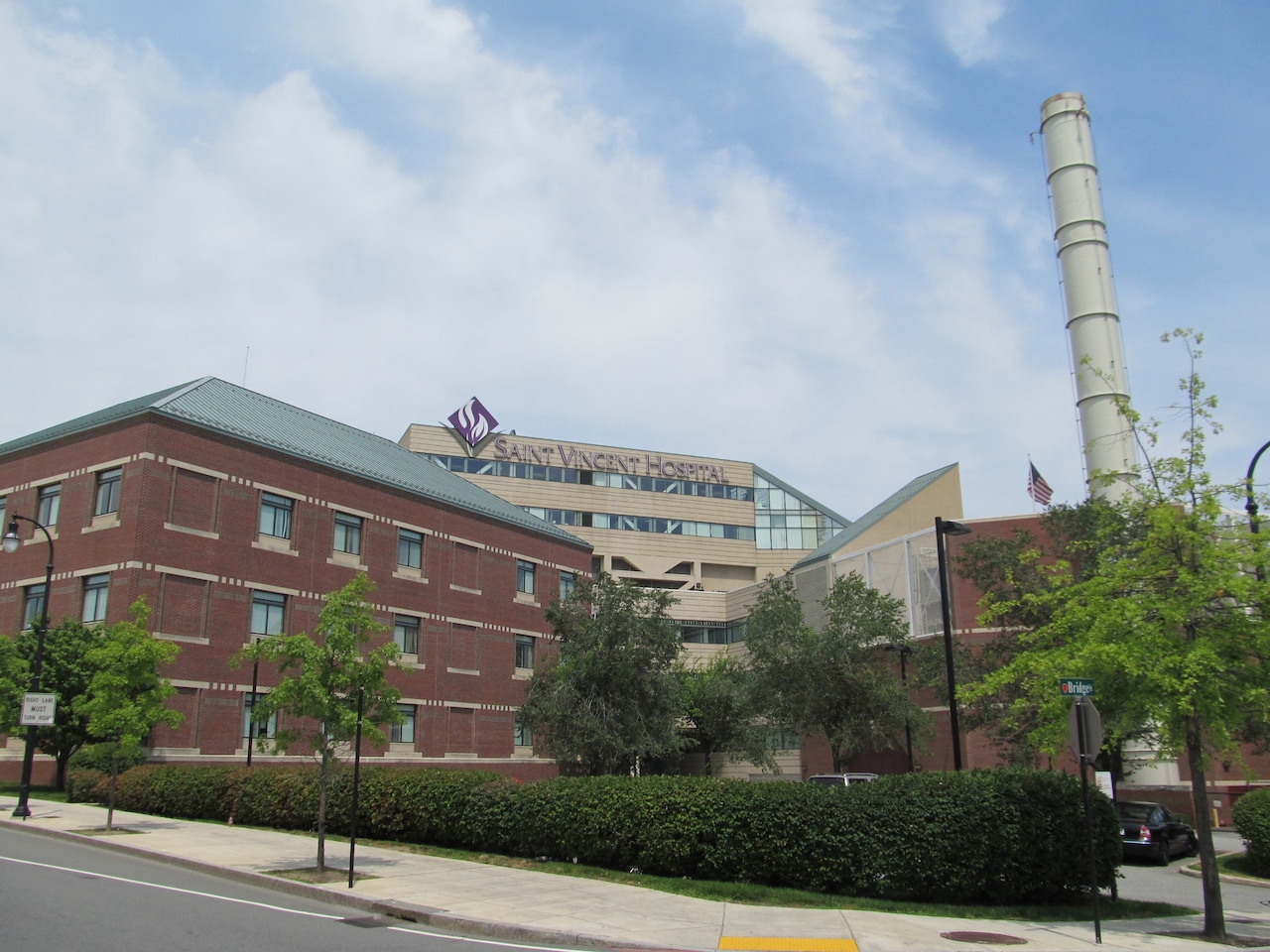
An investigation by the Massachusetts Department of Health (DPH) found that Saint Vincent Hospital in Worcester did not have enough equipment to properly monitor patients with heart problems the beginning of the year.
The DPH launched an investigation of the hospital, which is owned by the Dallas-based healthcare company Tenant Healthcare, on Jan. 31. According to Katheleen Conti, the DPH’s assistant director of media relations, the investigation began after the MNA — the largest nurses’ union in Massachusetts — filed several complaints regarding poor management and technology.
These complaints come among mounting tension between the hospital and the nurses’ union. According to MNA Director of Public Communications David Schildmeier, complaints were filed directly to the DPH and the Executive Office of Health and Human Services accusing Saint Vincent of not having an adequate number of staffing or equipment, leaving patients and nurses at risk.
Schildmeier said the accusations against Saint Vincent don’t only come from the MNA, as in March, eight former nurses filed a lawsuit in Worcester Superior Court against the hospital and Tenet Healthcare, claiming they were wrongfully fired for reporting unsafe patient care conditions. One week later, the National Labor Relations Board filed a formal complaint against the hospital — accusing administrators of not providing information to nurses about staffing and preventing nurses from speaking out about poor conditions.
“We continue to make direct requests to the DPH because conditions are still very dangerous here,” Schildmeier said. “There’s not enough staff to watch over these patients who need care.”
A spokesman for Saint Vincent’s declined to comment Friday about the accusations made by the union.
According to documents obtained by MassLive, the DPH met in February with 17 patients and seven nurses who told them the hospital lacked a sufficient amount of telemetry monitoring equipment, also known as tele-boxes.
“Based on interviews and medical record review, the hospital failed to provide care in a safe setting,” the report reads. The hospital failed to have a sufficient number of cardiac telemetry boxes, a portable device placed on the patient designed for continuous monitoring of a patient’s electrocardiogram, which records electrical respiratory rate, oxygen saturations to appropriately monitor patients.”
In the interviews conducted by the DPH, two nurses explained that tele-boxes are supposed to be available for any patient in each hospital unit but there are situations where a tele-box is not in the room. These situations can be critical, as some patients who need constant care require tele-boxes to monitor heart and respiratory rates, according to the National Institute of Health (NIH).
“Nurse number seven stated that there is typically not enough tele-boxes available on this telemetry unit,” the report reads. “This nurse stated that the situation comes up often where a patient arrives to the telemetry unit with telemetry orders and the nurse has to either wait for an available tele-box or go hunting for a tele-box.”
The NIH states that patients at risk of their heartbeat being dangerously slow, fast or irregular in the previous 24 hours need tele-boxes to track their heartbeats. If a tele-box arrives to a patient too late, they could die. According to the documents, one nurse told a DPH representative that a patient who needed a tele-box arrived at a hospital unit without one present. A nurse found a tele-box for the patient — 27 minutes after arrival.
“The patient has the right to receive care in a safe setting,” the report reads. “This standard is not met as evidenced by interviews and medical records.”
After reviewing their findings, the DPH submitted a statement of deficiency to Saint Vincent on March 5 and asked the hospital to submit a plan of correction to change how it appropriates and manage tele-boxes.
The hospital submitted its action plan on March 13, which included the purchase of 42 more tele-boxes, a training plan to teach new hires how to manage hospital beds with tele-boxes and a monitoring plan where 30 patients with tele-boxes will be audited every month to ensure they are receiving proper care with the machinery.
“Audits will be reported to the chief nursing officer weekly and to the hospital’s Quality and Patient Safety Council monthly until three consecutive months of 100% compliance is achieved,” the report reads. “Audits will be conducted periodically to ensure ongoing compliance.”
Conti told MassLive that the department had approved Saint Vincent’s action plan on March 15. The Centers for Medicare and Medicaid Services, a federal agency providing health coverage to those through Medicare and Medicaid, approved the action plan on March 19. A week later, the DPH closed the investigation, according to Conti.
Before the investigation’s conclusion, officials from Saint Vincent put out a press release claiming the Department of Public Health found no deficiencies in its staffing or quality of care and confirmed the hospital’s “commitment to high-quality care.” This statement was disputed by MNA, which accused the hospital of creating a culture that incited fear among nurses for speaking out against management.
The DPH, however, told MassLive that the investigation was still ongoing at the time — pushing back on Saint Vincent’s press release.
Schildmeier told MassLive the DPH’s investigation partially validated the concerns of the nurses union but said more needed to be done by the DPH. He said the MNA wants the DPH to send individuals to monitor the hospital to ensure employees are giving patients proper care — similar to how the state sent monitors to hospitals ran by Steward Health Care.
“It doesn’t go far enough,” he said. “These patients were in danger of suffering a heart attack and they were unmonitored. That all goes back to the dangerously low staffing levels.”
Nurses’ union struggles with Saint Vincent
The relationship between Saint Vincent Hospital and the MNA has been fraught. The nurses’ union has accused the hospital of lack of care, while the hospital has admonished the union for its statements.
In February 2021, nurses from the union went on strike as the two sides could not agree on staffing levels. The strike lasted 10 months, with the union gaining support from the Worcester City Council and then-Attorney General Maura Healey. In December of that year, the hospital and the union agreed on staffing levels and ratified a contract on Jan. 3, 2022.
Despite the strike’s end, the rift between Tenet and the nurses’ union is still wide and continues to grow as more complaints about poor working conditions have been lodged at the healthcare company from union members, former employees and national labor organizations.
“While the nurses ended the strike with great hope for a new beginning and a commitment to work with our administration to build a positive future, their CEO, Tenet’s Carolyn Jackson, had no such intention and has engaged in a concerted effort to attack nurses and endanger every patient under their care,” Schildmeier said.





